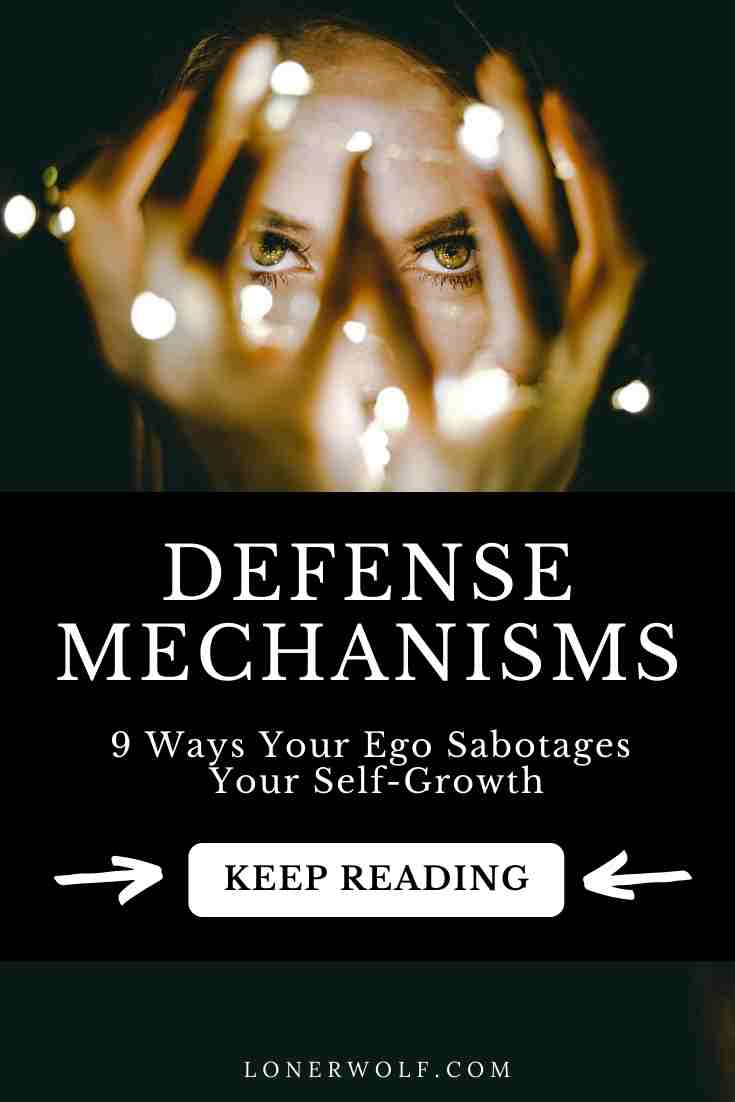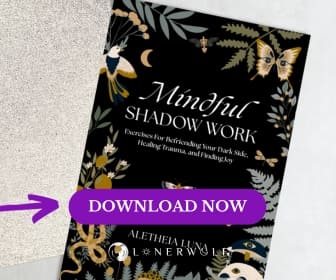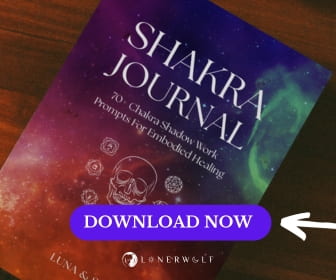You’re hopeless, useless, burdensome. Nothing will ever go well, everyone is always better than you, you’ll never be perfect. You want to be liked, but you’re unlovable, and a failure at life. Sound familiar?
To the majority of people this language does. Mental traps – or ego defense mechanisms – serve as the rusty cogs that continue the mechanic cycles of pain, toxic shame, and hopelessness within us. In many instances, they are so deeply ingrained in the mind, that we are completely oblivious of their existence.
The most important thing to realize about these cognitive errors is that they’re maladaptive ways of dealing with the world and the self. In fact, living in the world of mental distortions is like living a lie. Your perception is constantly tainted with melancholic negativity that brings forth unrealistic and untruthful thoughts.
Receive every enlightening journal, workbook, ebook, bundle, deck, meditation, and download that we offer here on our lonerwolf store in this all-in-one bundle (80+ items included!)
But it’s not your fault and there is a way of moving through this feeling of stuckness.
In this article, my goal is to help you identify, reframe, and deprogram these ego defense mechanisms. Doing so will allow you to experience more inner peace, self-love, groundedness, trust, and spiritual connectedness with life.
Table of contents
What Are Ego Defense Mechanisms?
Ego defense mechanisms (or mental traps) are psychological strategies that help us deal with the uncertainty and ambiguity of existence. When a painful truth or reality is too much for us to bear, you can be sure that an ego defense mechanism will jump in to save you. Think of it like a knight in shining armor that protects your sanity. The only difficulty is that, often, this inner knight is unwilling to let go of its desire to protect us due to fear and trauma. When this happens, we are left with old, outdated, and dysfunctional inner programming that runs on repeat, wreaking havoc in our lives.
17 Signs Your Ego Defenses Are Harming You

Pay attention to the following signs:
- You suffer from low self-esteem and self-worth
- You constantly get into fights with people
- You feel on-edge around others for no apparent reason
- You often feel like an innocent victim
- You feel like the world is against you
- You see the world in black and white (“good or bad,” “right or wrong,” “friend or enemy,” “us or them,” etc.)
- You tend to jump to extremes in relationships, i.e., one day you love your partner, the next you hate them
- You tend to be critical and sarcastic
- You rarely accept blame (because you “haven’t done anything wrong”)
- You are a cynic but at the same time an idealist
- You have high expectations for yourself and others
- You feel dissatisfied with yourself/life a lot of the time
- You have an addictive personality
- You tend to be obsessive
- You overthink everything
- You often feel like a phony/fake
- You feel disconnected from your true self and life
How many signs can you relate to?
9 Basic Ego Defense Mechanisms

The nine basic ego defense mechanisms are:
1. Making Assumptions
An assumption is a supposition. When we make an assumption, we believe that something is true based on what we think is true – without proof. Assumptions can be about others, yourself, or a certain situation in life. Assumptions often sound like this: “He treats me this way because ____”, “They think I’m a ____”, “I always do this because ____”.
Why it’s harmful: Assumptions create a lot of unnecessary emotional and mental pain, especially if you always assume the worst. Assumptions can also lead you to make false judgments about others. This can harm and even destroy relationships with the people you care about.
2. Extreme Beliefs
A belief is a conviction that something is true, even if it may not be. Often, beliefs are very extremist or black-and-white in nature. Beliefs often sound like the following: “I will never be able to speak normally,” “He/she hates me,” “Other people are always out to get me,” “No one will ever like me because I’m ugly.” Like all mental traps, beliefs are unconsciously held: they can be so deep-rooted that they evade the conscious mind.
Why it’s harmful: Beliefs are very blinding by nature. If they’re false they can also affect your self-worth profoundly as they can be so deeply held. When you struggle with low self-worth, every aspect of your life is negatively impacted and crippled.
3. Negative Comparisons
A comparison is a judgment we make when we measure two or more people/things against each other. Comparisons, for example, can exist between you and others, for instance, “He’s way smarter than me” and “My body is so fat in comparison to hers.” Comparisons can also exist between ourselves and our ideas of what should happen, e.g., “I should be able to work harder,” “I should be better at socializing.” Dissatisfaction and low self-esteem are the two characteristics that drive comparison: we want to be better, more perfect, more ideal, and excel over others. Furthermore, comparison also drives competition: we use other people and our ideals as a yardstick of success.
Why it’s harmful: Comparison breed tremendous jealousy and envy resulting in anger, pain, and frustration. These angst-ridden emotions put a large strain on our relationships with others and frequently destroy friendships, family connections, and romantic partnerships.
4. Obsessive Desires
To desire is to want something you don’t have. We do this because we’re discontent and feel as though, somewhere deep inside, we’re lacking. When we desire, we are plagued with the sensation that we don’t have enough. WE are not enough. Desires often sound like the following: “I want to be like ____ but I can’t,” “I want to buy ____ because it will make my life better,” “I want to be funny just like him.” Desires are closely linked to comparisons. When we compare ourselves to others or a mental ideal, we often find ourselves falling short, and thus arises desire.
Why it’s harmful: The basic principle of Buddhist thought is that desire equals pain. Often, desire results in lust, and lust results in idolization and obsession. The result is often feelings of unhappiness, anger, and jealousy. When we think of all the crime committed in the world (thefts, murders, rapes, etc.) they all result from an obsession which stems from desire. When we desire what we can’t have, the result is usually pain.
5. Strict Expectations

To expect is to have the preconceived idea that something should happen or will happen. Expectations are usually created by the mind that likes to possess control – even over future outcomes. When an expectation is challenged or not met, the result is anxiety, inner turmoil, and anger/rage. For instance, if you unconsciously expect your boss to treat you nicely, and are let down by their arrogance, you feel upset and filled with anger. Expectations stem from misguided certainty, and this is a symptom of security-seeking behavior. You can also create expectations for yourself, for instance, you may unconsciously think “I will blush and start to stutter,” and immediately … you do!
Why it’s harmful: Expecting certain behaviors from others usually results in disappointment, confusion, frustration, and anger – and this causes strain on our relationships. Furthermore, setting high expectations for yourself also results in suffering as you are, after all, human and imperfect. Expectations can also become self-fulfilling prophecies: they manipulate the outcome of a situation by predetermining whether it will be good or bad. For example, if you expect to be anxious, 99.9% of the time you will be. This can have an immensely negative impact on your life when your mind is already biased against you.
6. Lofty Ideals
An ideal is an imagined perfect outcome. One example of a common ideal is to find the “perfect lover” (the “One True Love”) – which is unrealistic as everyone has flaws and a shadow self. Other ideals we may possess might include wanting to find the perfect house, perfect job, or do everything right when it comes to our self-growth. Ideals are a symptom of perfectionism and they are usually set up as unrealistic goals that are almost always impossible to live up to.
Why it’s harmful: Because ideals are hard to achieve, we frequently feel like failures, like our lives aren’t good enough, and like nothing will ever go right for us. Additionally, ideals can cause you to live under immense pressure, creating a lot of chronic anxiety that looms in the background. When we frequently fail to match our inner ideal with the outer reality, we experience an inward collapse which can trigger depression and sometimes an existential crisis. Finally, as those who hold many ideals are often perfectionists, their loved ones constantly feel like they’re “not doing enough” or not being enough. This can put tremendous strain on our relationships.
7. Reactive Extremes
In psychology the technical term is “reaction formation” and this is something you’ll observe everywhere. The nature of the unconscious mind is that it requires absolute certainties – it needs to see the world in black or white. There is no grey, or “in-between.” As a result, our minds tend to jump to one extreme or another.
Many people, for example, who have had very strict religious upbringings grow older and become disillusioned with the dogmatic ideas they’ve been taught. Often, these people instantly jump onto the atheism bandwagon and become fanatical anti-God advocates – almost with the same level of dogmatism as the religion they were brought up in. Another example of a reactive extreme is a person who struggles to accept their sexuality. As a result, they might become actively homophobic and discriminate against the LGBTQI community (remember Colonel Frank Fitts from the movie American Beauty)?
Why it’s harmful: Jumping to reactive extremes, while natural, limits our capacity to experience, embrace, and express all authentic parts of us. Not only are we usually harming others (by reacting against them), but we are hurting ourselves in the process.
8. Suppression

All too often we live with the inner tension of conflicting desires that we fear will be socially unacceptable. Let’s say you want to laugh loudly and freely, but you know others will look at you strangely, so you suppress that authentic self-expression. Or perhaps you like a movie or a song that you know your friends don’t like, so you bury that desire away and forget about it.
While suppression can be helpful in some situations (like taking care of small, demanding children), it can be toxic when done regularly. Suppression doesn’t make a feeling, impulse, or thought within you go away. In fact, it can make it build inside like a pool of lava that is ready to explode at any point in the future.
Why it’s harmful: Suppression is a major obstacle in self-growth and living a fulfilling life because it results in an inability to be authentic to yourself (which is the key element in self-love). The more you suppress within yourself, the more you have to adopt a false persona or mask to deal with the outer world. The more you wear this mask, the phonier you feel, and an increasing level of disconnection from your Soul occurs.
9. Repression
Repression differs from suppression in one important way. While suppression is initially a conscious process of having a desire and learning to avoid or ignore it, repression is an entirely unconscious process.
For example, you might have had a traumatizing experience as a child that was so scary or unsettling that it had to be immediately buried. Of course, this was not your fault: it happened automatically as an ego defense mechanism. Yet, that repressed content still lies buried within your unconscious and can come out in your life in various destructive ways.
Why it’s harmful: The difficulty with repression is that it is automatic and unconscious. As such, we don’t even become aware of what our original authentic desires were because they were squashed out before they had the chance to blossom. The result is a feeling of being out of touch with your true self and alienation from life. The solution to this is to do some conscious inner work and go Soul searching.
***
Also, check out projection and splitting (which are too long to go into here). These are also ego defense mechanisms that can harm our wellbeing.
4 Roles the Ego Adopts That Sabotage Self-Growth

The four ego defense mechanism roles are:
1. Innocent Bystander
One of the greatest hindrances in anybody’s journey of self-growth is to fool themselves into thinking they haven’t done anything wrong. This may be why the recovering addict’s first step is to acknowledge that they have a problem. Most people live in denial or avoidance, denying the need to take a good look at themselves because it keeps them from properly recognizing their more unsavory traits and capacities.
“The world is screwed up but I’m completely guilt-free” is their basic outlook on life. They refuse to see the interconnection between their actions and lifestyle with the external world around them.
2. Innocent Critic
This defense mechanism is very similar to the Innocent Bystander, only this one avoids guilt by actively criticizing the world and people around them. Criticizing is our way of rebelling against society and wanting to find a way out, of wanting to be outside of the ‘herd’ while still feeling a sense of false participation.
Don’t get me wrong: critical thought is a necessary instrument in any person’s self-growth. But often these “critics” use critical thinking as a way of boosting their ego and to feel smarter than the ‘herd’ who haven’t realized what the critic has. Unfortunately, noticing what’s wrong with the state of affairs of the world isn’t enough unless you actively apply a solution to the problem.
3. Blameless Victim
I’m sure we’ve all come across an angry victim of life, someone who blames other people or the world for 100% of their difficulties. But everyone uses blame as a defense mechanism to some extent. In truth, what we’re defending ourselves from is our own responsibility for dealing with the unpleasant experience we’ve been given.
To indulge in blame is to give up personal responsibility and mentally delegate it to someone else, convincing ourselves that we are not responsible for the state of our lives, and instead blaming it on some “outside force.” The blameless victim ego defense mechanism blocks us from seeing clearly just how we are contributing to our own suffering.
Essentially, the blameless victim is one of the fiercest protectors of our ego. It causes us to feel that we’re never failing ourselves, or that we lack the maturity or strength to come to terms with the reality of the situations we’re confronted with. Instead, whatever happened is not evidence of our own inadequacy, but of someone else’s.
4. Almighty Controller
Finally, we come to the almighty controller – the ego role that adopts a guise of invincibility as a way of trying to misguidedly protect us. Let’s take a moment to stop and appreciate this well-meaning part of us: after all, it just wants us to be safe. The difficulty, however, is that this ego defense mechanism assumes a position of omnipotence. It assumes that if we try to exert control over everything we will finally be “safe.” The opposite is actually true. The more we try to control ourselves, others, and life, the more we suffer. We end up oppressing ourselves, repelling our loved ones, and resisting the current of life. In reality, the true power is not in fear-based control, but loved-centered mindfulness. We’ll explore this more below.
How to Free Yourself From Harmful Ego Defense Mechanisms

Before you learn how to undo, rewrite, and deprogram your mind from the above ego defense mechanisms, I want to highlight something important:
Not all mental patterns are bad.
Sometimes it’s necessary to have a certain belief in order to motivate yourself in the face of heart-breaking difficulty. Sometimes we need to jump to conclusions and make assumptions in order to protect ourselves from danger (e.g., assuming that the guy in a dark hoodie lurking on the street corner might try and mug you.) And without desire, there could be no progress in life.
But mental patterns become mental traps when they start interfering with our mental, emotional, and spiritual wellbeing and we struggle to free ourselves from them.
Below, I’ll share how to liberate yourself from the damaging impacts of these ego defense mechanisms:
1. Practice self-inquiry
When a negative emotion arises within you, inquire into it. Think of yourself like a psychoanalyst, teacher, scientist, observer – whatever word appeals to you – and examine the nature of it.
Ask questions such as:
- What am I feeling?
- What thought is at the root of this feeling?
- What evidence can I find against this thought/feeling?
- What might be an alternative explanation?
- What other options do I have?
Be as open and curious as you can. You might even like to journal about your experiences with self-inquiry if it helps. Learn more about how to journal.
2. Approach life with loving-kindness
When we examine the energy inherent in toxic assumptions, beliefs, comparisons, desires, etc. we see that it all stems from fear. This fear may be that we’re not enough, that we might miss out, that we may be hurt, that we may be abandoned – whatever the case, it’s all fear-based.
For over a decade, we've strived to make this website a haven of free, valuable information. Imagine a world where this knowledge wasn't readily available. If this post sparked a meaningful insight or helped you in any way, please consider a donation as a heartfelt "thank you" for keeping this resource free. Every contribution, big or small, allows us to keep giving back.
What is the opposite of fear?
Answer: love.
Fear constricts and closes whereas love opens and expands.
In order to deprogram ego defense mechanisms we need to approach ourselves, other people, and life itself with loving-kindness. Yes, this is easier said than done, but remember that it takes time and practice.
Even the inability to approach life with loving-kindness can be approached with compassion. Can you be gentle with your lack of gentleness? Can you forgive your lack of forgiveness? Can you practice softness in the midst of hardness?
If you would like to learn how to approach life with more loving-kindness, I recommend reading the following articles:
- How to Love Yourself (Ultimate Beginner’s Guide)
- How to Practice Mindful Self-Compassion: 6 Life-Changing Steps
- The Ultimate Guide to Heart Chakra Healing
3. Be defiant and challenge yourself
You have the right to ask “is that true?” any time a thought about yourself or someone else arises.
By poking and prodding at the presumptions that emerge in your mind, you’ll be able to take away their power by undermining their authority. After all, unchallenged thoughts can easily become like inner dictators that enslave us to painful emotions and demoralizing self-beliefs.
You don’t need to be a slave of your mind if you dare to question it.
Be defiant, be a rebel, be a provocateur. When an assumption, belief, or comparison arises, ask “can I be 100% sure that is true?” Such a simple question has a liberating impact on your psyche.
4. Meditate to develop witness consciousness
Meditation is an ancient technique used as a way of accessing more inner peace, clarity, and Oneness. However, you don’t need to be religious or even spiritual to practice it.
In this context, meditation is a dynamic technique for learning how to witness your thoughts instead of becoming them. Most people are so attached and identified with their thoughts that they aren’t aware that there’s a great stillness inside of them that exists outside of thought.
If you’ve never meditated, this may sound confusing to you. But think of it as the sky: the sky is always there, and thoughts are like clouds in that sky that come and go. No matter what cloud (thought) arises, the sky is always there underneath, unchanged. The same applies to your consciousness.
To take a step back from assumptions, beliefs, comparisons, desires, expectations, and ideals, the most direct method is to meditate. There are many free thought-witnessing meditations on youtube you can search for, or you can try downloading a free meditation app like Calm, InsightTimer, or Headspace to create a daily practice.
Dedicate 5-10 minutes at first to meditating and try your best to be consistent. Although the practice may be frustrating at first, it is the most powerful and scientifically validated practice I know of for undoing the damaging impacts of mental traps. So keep persisting, even if you suck at it at first (which you most likely will because we all do).
Here’s a simple five-minute meditation you can try:
- Find a quiet and undisturbed place
- If it helps to set the mood, play some quiet ambient music in the background
- Sit down on a chair or cushion, keeping your back straight
- Close your eyes (or if you prefer, leave them slightly ajar)
- Bring your attention to your breath
- Notice your chest/belly rise and fall, or the air enter and exit your nostrils (whichever is easier for you)
- When your thoughts wander, notice the thought, and draw your focus back to your breath
- Continue this practice for five minutes
- When finished, do a little stretch and slowly transition to the rest of your day
Eventually, you will be able to notice the thoughts that arise more and more. You’ll realize how busy and how much of a chatterbox your mind is (don’t worry, all of us struggle with hyperactive minds). But with constant meditation, your mind will begin to calm down and you’ll be able to catch ego defense mechanisms as they arise.
Don’t be put off by the simplicity of this practice. It may be simple, but it is tremendously powerful and empowering.
5. Cut yourself some slack
Go easy on yourself. It’s easy to have a perfectionistic mindset even about the above healing techniques. So realize that you’re human, you’re bound to make mistakes, you very likely will mess up, and this is all normal and okay.
When you adopt a relaxed attitude that allows room for failure, there’s less stress and tension. Giving yourself permission to have a laidback mindset will also act as a natural guard against further ego defense mechanisms from taking root.
***
I hope the advice in this article has helped. Remember to take your time and go easy on yourself. Your ego is a complex and multi-layered force within you that requires time and gentleness to dismantle. But by arming yourself with this knowledge and the above tools, you will eventually free yourself from dysfunctional patterns and negative habits. The result will be an increased sense of inner freedom, centeredness, love, and self-understanding.
Tell me, what ego defense mechanism do you struggle with the most? How has it limited you and which of the above practices do you plan on implementing? I’d love to hear below!












I suggest looking at each of the ego defense mechanisms and ego roles in this article, then ask these questions for each one of them. 1. Am I just assuming only others have this experience in their head, or do I consider the possibility for myself? 2. If not, can I think of examples where I’m like this in my life, even if just a bit? 3. If no past memories can be found of this, think of the recent or far past, then see if anything applies here. 4. Are you sure? Check again. 5. If you checked enough to be sure, that’s okay. If not, feel free to examine your actions again, fi you wish. Then maybe look up “Defense mechanisms list in psychology,” and ask yourself these questions for each of that.
Hello. I am starting to be aware and look at the cost of defense mechanisms. At work, I get feedback that I don’t respect managers enough and that I need to accept more of what I perceive to be challenges that are endemic to the system that can be fixed – – such as not providing resources needed to do the job, ineptness of some staff, and a culture that is inconsistent with professed values. I recognize in myself issues of entitlement and having expectations. However, how can I navigate when there are poor systems in place, and power struggles due to insufficient resources all around. I work in a senior community. I love the residents, the feeling is mutual. My life is truly enriched by my being in community with them. How does one deal with what seems to be real organizational shadows that bring up one’s own reactivity. I am not enlightened, I am open to learning. I know things are not black and white. I am also learning we are all human. I love my job and my supervisor recognizes what I bring to it, encourages me to deal more skillfully with systemic problems by being more… Read more »
It’s the sneaky ones that get me. I can deal with the obvious lies my mind throws up as defense mechanisms but it is the little questions it makes me ask which I find hard to recognise and not challenge. Before I know it I am going along with the thought without even being aware of its origin. For instance the thought “Are you getting enough attention from your partner?” seems innocent enough and I could start trying to answer that question. However that question has come from a place of stress and discomfort. My mind is trying to find ways to address the feelings of discomfort by suggesting it is someone else’s fault! It can take a while to recognise such sneaky thoughts for me. But once I have, I pin them down by writing them out and making an action plan to deal with the underlying issue, even if that action plan is just to accept the discomfort and stop trying to project it externally. So my answer is “there is no specific amount of attention I should get from my partner, that thought is my mind trying to find a solution to the discomfort it is currently… Read more »